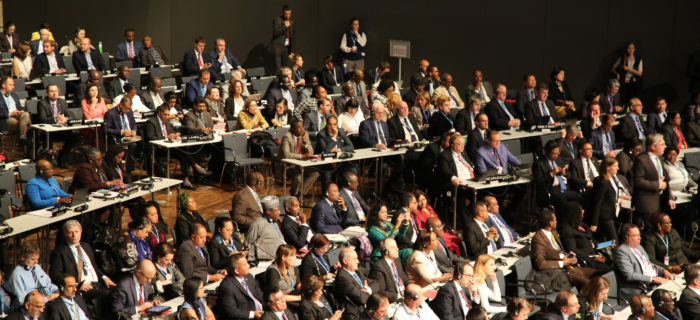The Bonn Climate Talks: Farming, Global Warming, and Disaster Capitalism
Eric Holt-Giménez is the author of the new book A Foodie’s Guide to Capitalism: Understanding the Political Economy of What We Eat.
Three things stand out at the United Nations Climate talks in Bonn, Germany. First, that the United States is the only country in the world not to sign the Paris Accords; second, the tremendous efforts on the part of the rest of the world—including major corporations—to move forward on these non-binding agreements; and third, the presence of governors, mayors, and civil society organizations from the United States pushing to implement the Paris Accords in defiance of the Trump Administration.
There’s one more pitifully remarkable thing… the official US delegation. Charged with explaining Trump’s position to a world of actual scientists and seasoned climate activists, their only recourse is a canned set of protectionist arguments and alternative facts that only make sense in the ever-shrinking alternative universe of climate change deniers. But the delegation is a minor pawn in Trump’s climate gambit.
The play is simple: let the corporations in Bonn find ways to finesse the Paris Accords so they can reap profits from mitigation and adaptation schemes while the Trump administration plays to its nativist, coal-fired base for political capital, as he pushes for deregulation and tax breaks to encourage corporate expansion—particularly for the energy sector.
George David Banks, representing the White House stated flatly, “Climate mitigation is an important goal of the United States,” Mr. Banks said, “but I don’t think it’s any surprise that economic security and energy security are higher priorities.”
The official US position has been soundly countered by the We Are Still In declaration that asserts that regardless of the White House, “We, the undersigned mayors, county executives, governors, tribal leaders, college and university leaders, businesses, and investors are joining forces for the first time to declare that we will continue to support climate action to meet the Paris Agreement.”
Signed by over 2,500 government, business, academic, and civil society leaders across the United States, the declaration represents over 130 million US citizens, accounting for $6.2 trillion of the U.S. economy.
Stay in the loop with Food First!
Get our independent analysis, research, and other publications you care about to your inbox for free!
Sign up today!The declaration was also signed by 24 US farm organizations.
Wait, what? Don’t farmers want cheap oil and gas? After all, it takes 25 kcal of fossil energy to produce just 1 kcal of the meat we love to eat. Our farm sector uses almost 20% of the national energy budget. Isn’t the rural US the cradle of climate denial? Think again.
To understand the farm position in the face of climate change, we need to differentiate between farming and the agribusiness corporations that make their money off of farmers.
Farmers want a favorable climate and stable prices—not severe weather patterns, crop loss, market volatility and potential bankruptcy. Agrifoods corporations want to sell more products. Climate change offers them a chance to market new “climate smart” seeds and bigger machinery, as well as satellite information on soils, weather and markets for “precision agriculture” and “sustainable intensification.” There are other, less costly, less environmentally destructive, and less energy-intensive ways of producing food—that don’t create a class of farms “too big to fail,” but these don’t bolster the corporate bottom line.
In Bonn, Fanny Metrat, from the French farmer organization Confédération Paysanne denounced the false solutions being pushed at the climate talks,
“At the climate negotiations, governments are putting forward false solutions. We call them false because these proposals do not bring real change but, rather, bolster corporate profits,” said. “Carbon markets, geoengineering, so-called climate smart agriculture are being promoted by the same people who are also promoting emission-intensive livestock production and an export-based industrial agriculture which requires massive amounts of fossil fuels. It is a big contradiction,” she explained.
Paula Gioia, of the International Coordinating Committee of Via Campesina stated,
“We must change the system, and by this, stop the system from changing the climate.”
The family and peasant farmers rep[resented by organizations like La Via Campesina and the 24 rural signatories to We Are Still In, produce 70% of the world’s food on just 25% of the land. Among these farmers, the spread of agroecology—forms of producing food that work with local ecosystems and actually capture carbon, conserve resources—has the potential to build resiliency into our food systems, while reversing global warming itself.
What is playing out in at the UN Climate talks, and in the heartland of the United States, is just how farming—that produces 40% of the world’s greenhouse gases—is going to walk the line between global warming and disaster capitalism.
Featured photo by Rwanda’s Ministry of Environment.


 Help Food First to continue growing an informed, transformative, and flourishing food movement.
Help Food First to continue growing an informed, transformative, and flourishing food movement.




